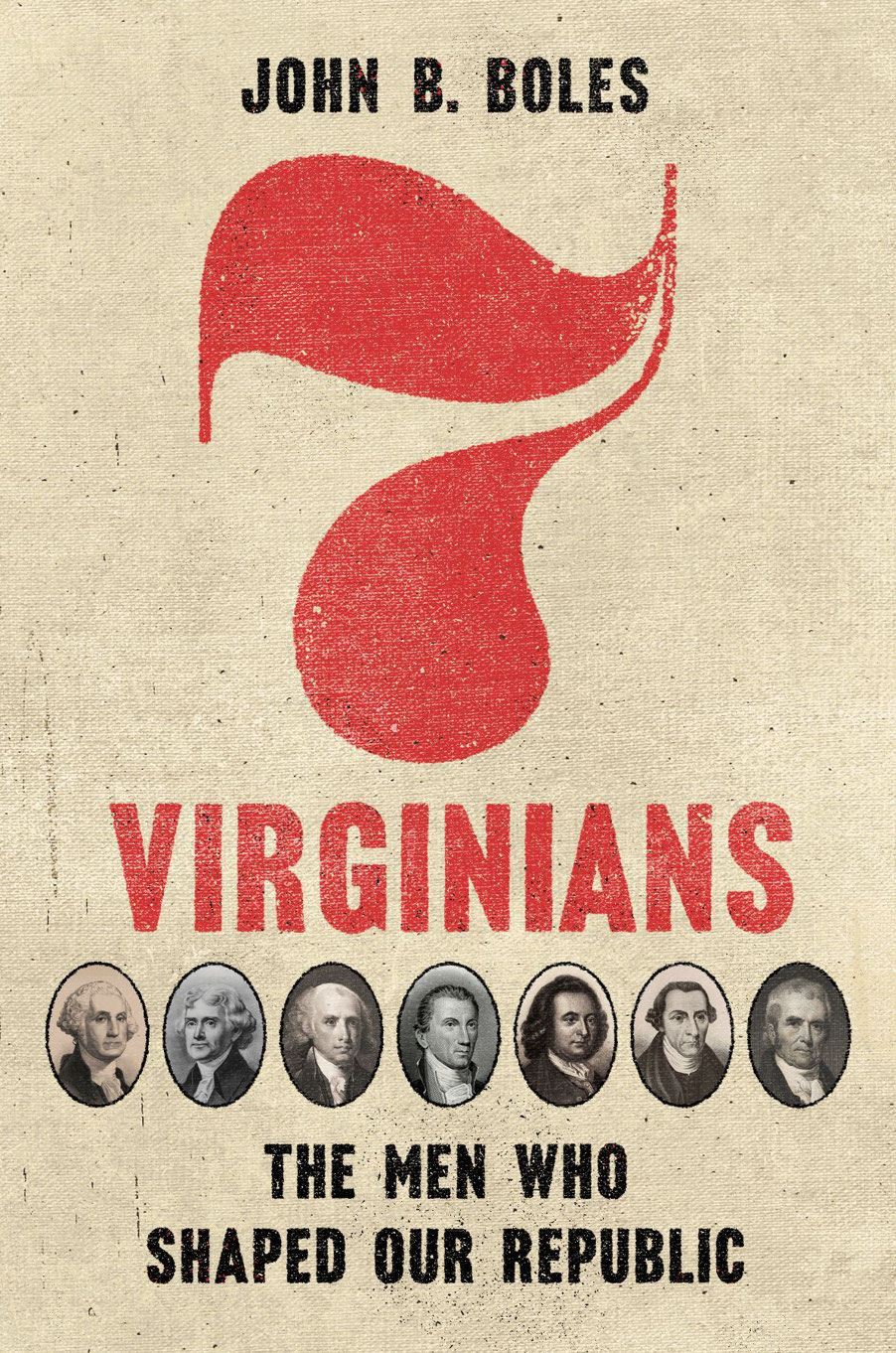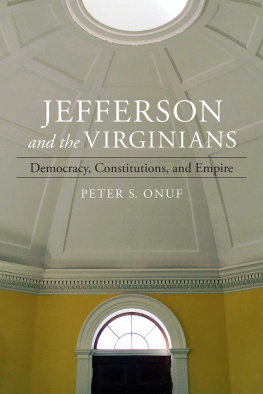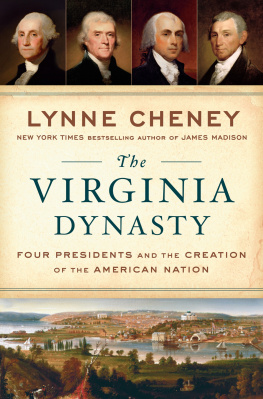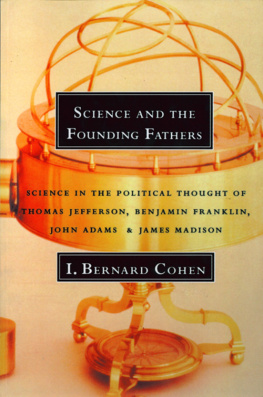
Seven Virginians
Also by John B. Boles
Jefferson: Architect of American Liberty
A University So Conceived: A Brief History of Rice
Seeing Jefferson Anew: In His Time and Ours (coedited with Randal L. Hall)
University Builder: Edgar Odell Lovett and the Founding of the Rice Institute
Unto a Good Land: A History of the American People (coauthored with David E. Harrell Jr., Edwin S. Gaustad, Sally Foreman Griffith, Randall M. Miller, and Randall R. Woods)
Shapers of Southern History: Autobiographical Essays by Fifteen Historians (edited)
Origins of the New South, 18771913, Fifty Years Later: The Continuing Influence of a Historical Classic (coedited with Bethany L. Johnson)
A Companion to the American South (edited)
Autobiographical Reflections on Southern Religious History (edited)
The South through Time: A History of an American Region
The Irony of Southern Religion
Masters and Slaves in the House of the Lord: Race and Religion in the American South, 17401870 (edited)
Interpreting Southern History: Historiographical Essays in Honor of Sanford W. Higginbotham (coedited with Evelyn Thomas Nolen)
Black Southerners, 16191869
Dixie Dateline: A Journalistic Portrait of the Contemporary South (edited)
Religion in Antebellum Kentucky
Maryland Heritage: Five Baltimore Institutions Celebrate the Bicentennial (edited)
America: The Middle Period: Essays in Honor of Bernard Mayo (edited)
The Great Revival, 17871805: The Origins of the Southern Evangelical Mind
Seven Virginians
The Men Who Shaped Our Republic
John B. Boles
University of Virginia Press
Charlottesville and London
University of Virginia Press
2023 by the Rector and Visitors of the University of Virginia
All rights reserved
First published 2023
Library of Congress Cataloging-in-Publication Data
Names: Boles, John B., author.
Title: Seven Virginians : the men who shaped our republic / John B. Boles. Other titles: 7 Virginians
Description: Charlottesville : University of Virginia Press, 2023. | Includes bibliographical references and index.
Identifiers: LCCN 2022042437 (print) | LCCN 2022042438 (ebook) | ISBN 9780813949093 (hardcover) | ISBN 9780813949109 (ebook)
Subjects: LCSH: StatesmenVirginiaBiography. | VirginiaPolitics and government17751865. | StatesmenUnited StatesBiography. | VirginiaBiography. | United StatesPolitics and government17751783. | United StatesPolitics and government17831865.
Classification: LCC F230 .B713 2023 (print) | LCC F230 (ebook) | DDC 975.5/03dc23/eng/20220920
LC record available at https://lccn.loc.gov/2022042437
LC ebook record available at https://lccn.loc.gov/2022042438
Cover art: George Washington (Library of Congress, Prints and Photographs Division [LC-DIG-pga-10095 DLC]); Thomas Jefferson (National Archives [NAID 518078]); James Madison (Library of Congress, Prints and Photographs Division [LC-DIG-pga-11881]); James Monroe (Bureau of Engraving and Printing; Wikimedia, restoration by Godot13); George Mason (Library of Congress, American Memory Collection/University of Chicago Library); Patrick Henry (From Americana, Beach, ed. [New York: Scientific American, 1904]; Internet Archive/Robarts Library, University of Toronto); John Marshall (Asher Brown Durand, after Henry Inman, The Metropolitan Museum of Art, New York [MET, 30.15.33]); background and numeral (Shutterstock.com/1203969238, 1734274994)
In 1972, I dedicated my first book, with love, to my wife, Nancy; now, fifty-one years later, I dedicate to her what will perhaps be my last book, again with love.
Contents
In the course of teaching and editing for a half century, I have read countless articles, books, dissertations, and student papers and heard scholarly presentations about much of the contents of the present book, long before I had any such book in mind. Much that I know came from this lifetime of engagement with the material as a working academic. Unfortunately, because most of these years I did not have this book in mind and hence took no specific notes, I honestly do not remember in many cases where I first learned what I now believe to be true about this particular part of the past. While I do cite specific quotations and occasionally the arguments of certain books, generally what I write simply reflects years of reading. Suffice it to say, we exist in a world of wonderful historical scholarship, and one of the pleasures of my life has been the freedom and leisure to read as much as I could if not as much as I wanted. To the hundreds of historians, academic and freelance, as well as the dedicated editors of documentary projects, who have contributed to my understanding, I owe inestimable thanks.
Various colleagues over the years have also taught me much, and librarians and archivists have assisted me generously over the decades. Rice University has long supported my endeavors, and to itits administrators, faculty, and studentsI express my heartfelt appreciation. Rice has provided a subvention for this book, whose production costs were increased by supply-chain disruptions and other COVID-related problems. I will not try to list all the individuals who have helped along the way; they know themselves and my regard for them. But I must single out Randal L. Hall, Bethany Leigh Johnson, and Suzanne Scott Gibbs at Rice. My family has always patiently supported or put up with my efforts, especially my wife, Nancy, and I here thank them all, especially Nancy. One of my oldest colleagues, from my first teaching appointment in 1969, Joseph W. Cox, again stepped up and agreed to read the manuscript to ensure its accessibility to a general audience.
I came to Rice University as a student in 1961, the age of Sputnik, assuming it my patriotic duty to study science, but calculus, physics, and chemistry in my freshman year helped redirect my interests to an even earlier enthusiasm, history, and I have never regretted that change in major. I have had several wonderful mentors, have worked with treasured colleagues, and have taught a multitude of bright, curious, and eager students, both undergraduate and graduate. What a privilege it has been! Because I became a historian as a graduate student at the University of Virginia in the mid-1960s, it is fitting that what might be my last book is published by the universitys press. I would like to express my sincerest gratitude to Nadine Zimmerli of the press for her wise and patient guidance through the process of acquisition, to J. Andrew Edwards for shepherding the book through production, to freelancer Beatrice Burton for her skillful copyediting, and to another freelancer, Kate Mertes, for compiling the index. Others at the press worked to design, publicize, and otherwise promote this project. I appreciate their combined efforts. As with rearing a child, it does take a village to publish a book.
Seven Virginians
It is one of the single most remarkable facts of American history. Within the span of slightly more than three decades, 17251758, seven men were born in the northeast quadrant of the colony of Virginia who would ultimately play a vastly disproportionate role in the founding of this nation. In order of birth, they were George Mason, George Washington, Patrick Henry, Thomas Jefferson, James Madison, John Marshall, and James Monroe. All household names it is true, but their closely intertwined lives and careers have never before been integrated and jointly employed to tell the story of how the colonies came to break away from their mother country, fight a revolution, and write a constitution, thereby establishing a new nation. They helped ratify that Constitution, set the infant nation in motion, develop its governing procedures, organize its first political parties, evolve the role of the president, and subsequently guide the maturation of the Supreme Court. In each of these critical events, one or more of this group of men played essential roles. That is, they were indispensable actors in the creation of the United States. Of course, there were other influential leaders from other colonies, particularly Massachusetts and Pennsylvania, but no other colony produced such a large cluster of such significant leaders as did Virginia.
Next page






